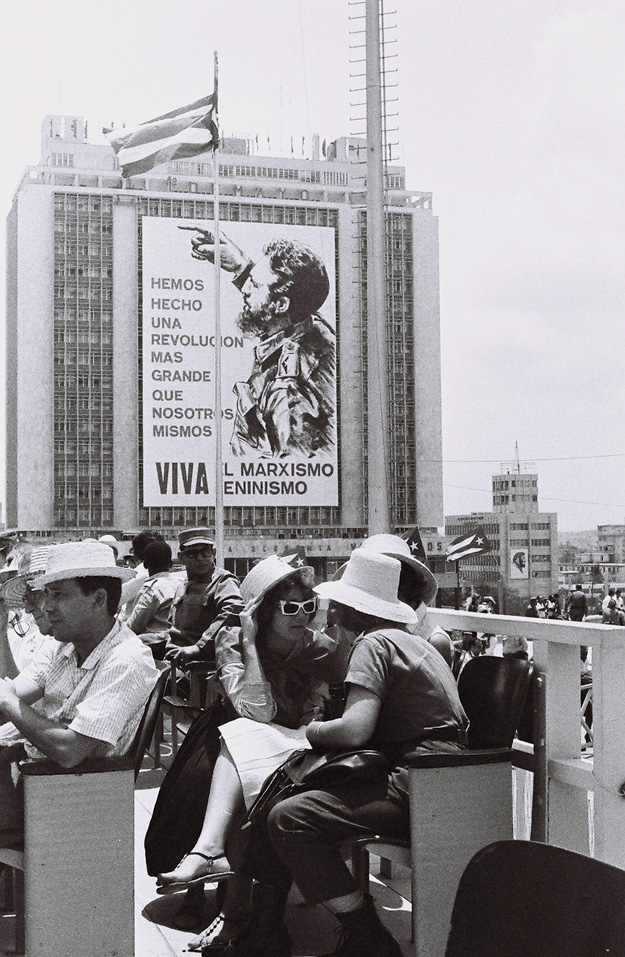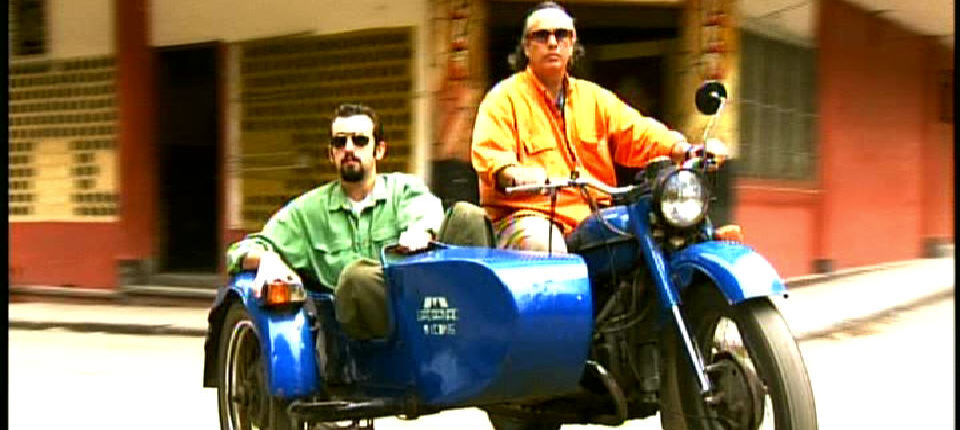In the 1960s the world flocked to Cuba to see the birth of a revolution, and now, in the first decades of the 21st century, the world hurries to witness—travelers say—its last breath: “I want to go before it changes!” Beyoncé and Jay Z’s 2013 trip to Cuba has a lot more in common with Simone de Beauvoir and Jean Paul Sartre’s 1960 historical visit than one might think.
Like the trip to the Soviet Union, or the trip to Mao’s China, the trip to revolutionary Cuba is a 20th century genre. By genre I mean that travel to these historical, geopolitical coordinates is generally framed by well-established tropes, characters, and plots. Their source is a vast and intricate textual and audiovisual archive of motley travelogues and reports: Henri Cartier-Bergson’s photo essay for LIFE magazine in 1963, to give a notable example.
Our contemporary traveler might ask at this point, “Why should I care about these old stories?” And we might ask this traveler, in turn, “Does this genre and its narrative commonplaces not frame your experiences, desires, and motivations? Are not these old plots and characters and settings the ones precisely behind the idea of going before it changes?”
These images of revolution and rumba, of a land frozen in time, rest on several faulty premises, but they are rooted in a curated selection of images, sounds, and expectations built over many years. It would be easy to demonstrate that Cuba has changed many times over in the last three decades, and easier still to point out the inadequacies of this specific notion of change as form of understanding history. But suppose, for a moment, that we consider this sentiment as a symptom of a more intractable condition.
In the 1960s, the trip to Cuba was usually undertaken by those curious about—and sympathetic to—the revolutionary process underway. In turn, criticism of such politically motivated travels was never far behind. Scathing indictments of commitment at a distance, neocolonial condescension, willful hyperopia, tribal sectarianism, and wanton exoticism have been de rigueur in commentaries about these ‘fellow-travelers’ and ‘political pilgrims.’ In fact, these disapproving texts can be said to comprise a supplementary subgenre of their own, and were directed in particular at those traveling from North America and Western Europe. (Meanwhile, a parallel and complementary travel archive of peoples and goods within these circuits remains largely unexplored.)
A casualty of Cold War sensibilities, travelogues to really existing socialisms consequently became nothing more than the target of habitual reactionaries and penitent apostates, or were quickly put behind and forgotten as a product of their time, as youthful indiscretions. (The corpus of the so-called “non-communist left,” for lack of a better name, has suffered an even worse fate, for many of the same reasons.) But a look back at why both the genre and the affectively charged responses it generated emerged in the first place, and a reactivation of the forgotten texts of radical dissent, might hold clues to new ways of seeing as we pack and unpack our bags.
“So that Mayakovsky’s suicide will not be repeated,” an occasion piece by the Mexican writer, philosopher, and activist José Revueltas, is a good example of the selective oblivion at work in these archival operations. Beginning with a meditation about his own travels to early revolutionary Cuba, Revueltas responds in this piece to the Padilla affair—the censorship event that irreversibly divided intellectuals in the left with respect to the Cuban revolutionary process.
Yet the exhaustive scholarship on this episode has passed over Revueltas’s intervention in favor of the more ordinary letters of support or denunciation of Sartre, Cortázar, and Sontag. Perhaps this is because the political position and the tenor of the text are quite different from the stock intellectual responses to the Padilla affair of Revueltas’s contemporaries: strident disillusionment (Mario Vargas Llosa), cautious criticism but principled commitment (Julio Cortázar), and private concern but public defense as political necessity (Gabriel García Márquez), to give three classic examples from the Latin American canon.
Even now, Revueltas’s 1969 essay reads as a theoretically shrewd and a hauntingly poetic analysis of the political and philosophical challenges confronting Cubans at the end of the long 1960s:
“A tremendous and incredible historical amnesia exists in Cuba and in all of Latin America. This contains the danger that revolutionaries of all countries may fall into the same negative experiences of which there are so many examples in the history of the Soviet and international communist movement. But there are books, there are documents, there are publications and it is unjustifiable that they not be read by the revolutionary youth of Cuba and all countries of the Americas in order to forewarn our revolution and our movement lest identical errors befall us; errors which history has already proven to be real betrayals of communism.”

Presidential grandstand with poster in background, Deena Stryker Photographs, David M. Rubenstein Rare Book & Manuscript Library, Duke University.
On the same topic, the German poet and theorist Hans Magnus Enzensberger penned “Tourists of the Revolution” to show the limitations of a literature written by politically inspired travelers to ideologically exotic locations. But Enzensberger does so by looking at the aesthetic, material, and symbolic conditions of production of these texts, rather than by psychologizing the travelers’ motivations. These conditions were the propaganda wars and the utopian falsifications of both actually existing capitalist and communist political apparatuses.
To be sure, Enzensberger is impatient with the ideological incoherence of some of his colleagues. (He, too, would travel to and live in revolutionary Cuba in 1968 and 1969). But his observations are those of a strictly materialist observer:
“In Havana I kept meeting Communists in the hotels for foreigners who had no idea that the energy and water supply in the working quarters had broken down during the afternoon, that bread was rationed, and that the population had to stand two hours in line for a slice of pizza; meanwhile the tourists in their hotel rooms were arguing about Lukàcs.”
The larger epistemological issue, argues Enzensberger, is that these modes of travel and their narratives hinge on individual—and highly individualized, when they took place as part of official guided tours— experiences that were read in rarified informational contexts. Whatever their aesthetic value and political purpose, these narratives could hardly be asked to inform accurately, much less to offer the kind of comprehensive scholarship that could not be produced, yet was urgently needed. In this sense, a prescription at the conclusion of this piece might be as good advice today as it was then:
“Now that the objective difficulties are decreasing and it is becoming less and less a question, in many countries, of endangering anyone by talking with them, now that traveling is ceasing to be an individual privilege, it should then be possible to launch a massive attack on this overdue task that no one has performed as yet: the analysis of socialist societies or those that go by that name. Individual messengers cannot undertake such an investigation.”
The deep political crisis of the 1960s in the United States—and the Vietnam War in particular—had driven Enzensberger to stay in Cuba for a time. How many of today’s political crises tempt the contemporary traveler to see the island firsthand? How many of today’s democratic failures have inspired a look back through the archives?
Twentieth-century revolutions were events of global impact, constitutive of shared mass utopias. Consequently, their demise as laboratories of collective desires is the historical condition under which many of today’s travelers hurry to book passage to Havana. These locales offer opportunities for critical reevaluations of what these processes were, as opposed to what they called themselves. Only then can dormant imaginaries be called upon for redeployment.
Other frameworks, genres, characters, and plots might emerge as well. Is that not a more interesting motivation for all of us, enlightened travelers of the 21st, than going anywhere before it changes? We, the practical utopians, to borrow David Graeber’s term? A capacious, critical, political imagination that responds anew to long unfulfilled demands surely has plenty of work ahead. But unlike the fellow travelers of the last century, we can no longer travel to Cuba, or elsewhere, under the illusion of witnessing the ruins of a future past.
COVER IMAGE: Ry Cooder and his son, riding a Russian motorcycle through Centro Habana. Screenshot. Buena Vista Social Club. (Dir: Ry Cooder, 1999).


